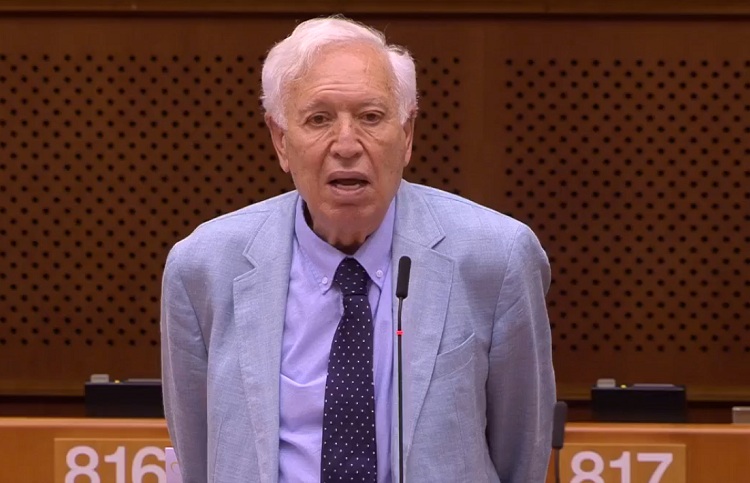The Diplomat
Former Minister of Foreign Affairs José Manuel García-Margallo believes that the Government of Pedro Sánchez has renounced the sovereignty over Gibraltar with the principle of agreement reached with the United Kingdom on December 31 and with it set a precedent by accepting a colony in Spanish territory, which affects national sovereignty and could be extended to Catalonia.
In an interview with Europa Press, the now Popular MEP regrets the secrecy with which the Government has carried out this negotiation and considers that from what has been revealed so far by the Minister of Foreign Affairs, Arancha Gonzalez Laya, it can be deduced that Spain has given away “the trump cards and incentives it had to negotiate” over Gibraltar.
In his opinion, Spain has achieved nothing with this principle of agreement – which should lead to an agreement between the EU and the United Kingdom on Gibraltar – beyond the “relief” of the Campo de Gibraltar, whose population “saw with anguish” the possibility of a hard Brexit on December 31st because of the impact this would have on the economy of the area.
Meanwhile, both the British Prime Minister, Boris Johnson, and the Gibraltarian chief minister, Fabian Picardo, “are clapping their ears. In the case of London, because it has managed to “maintain its dominance over the territory and maintain the base,” and in the case of the Rock because they will continue to be British but “live in the EU as if the United Kingdom had not left.
“This means giving up sovereignty forever and allowing the existence of a tax haven on the doorstep and condemn the Campo de Gibraltar to have a much worse situation” than that of the Rock, he stresses, as it seems logical to think that companies will prefer to settle in Gibraltar if they do not have to pay taxes and not on the other side of the current fence.
According to Garcia-Margallo, this was precisely what the EU tried to avoid with the Brexit, that “United Kingdom not become a Singapore” in which companies pay less tax, have less stringent working conditions and less environmental obligations and therefore generate a “situation of inequality” with companies installed in the EU. In this sense, he doubts that “the EU will allow this”.
On the other hand, it is a pity for González Laya to say that the Government has not given up its claims to the sovereignty of Gibraltar but “it has gone from the 19th century to the 21st century”. “As far as I know Felipe González, Gregorio Peces Barba, Felipe Morán… all those who have claimed the sovereignty of Gibraltar were not in the nineteenth century,” he stressed.
Thus, he wonders if in the twenty-first century “the ‘progre’ is to have a colony and a tax haven in your territory,” warning that “that sets a precedent. “Sovereignty, according to them, is an ‘old’, Francoist concept… Are we going to do the same in Catalonia, areas of shared prosperity,” says García-Margallo.
When talking about “shared management” in the case of Gibraltar, “are we also going to apply it to Catalonia,” he asks, also questioning “what is your concept of territorial integrity” and if it matters to the Government. With this, he warns, “we are touching on the issue of national sovereignty and, to give it up, is to give up 300 years of permanent claim”.
The former Foreign Minister, who will soon publish a book on Gibraltar along with the former Secretary of State for the EU Fernando Eguidazu, also stresses that when the eventual entry of Gibraltar in Schengen – once the agreement between London and the EU – would give state status to one of 17 territories that, according to the UN, are still to be decolonized, since only states are part of the agreement without borders.
Furthermore, it is important to note that it will be the European border agency Frontex, and not Spain, that will carry out the controls at the port and airport. With this, “Spain would be the only one of the 193 countries in the United Nations that does not control its borders”.
Moreover, by establishing control at the port and airport will enter the territory of Gibraltar, “probably without tariff” but what “is safe without paying VAT, tax on snuff, alcohol and oil,” he says, recalling that one of the “engines of the economy of Gibraltar is precisely the smuggling of snuff. The abolition of controls in the future, he prevents, would not prevent that tobacco entering Gibraltar “enter into sacks in Spain.
Lost opportunity
For the PP MEP, the coalition government between the PSOE and Podemos has missed the opportunity offered by Brexit regarding Gibraltar. Given that the inhabitants of the Rock voted overwhelmingly in favour of staying in the 2016 referendum, if they wanted to continue being part of the EU they needed another member state to take responsibility for their external relations, as the UK had done until now.
The only option in that case, it is worth noting, was Spain, in accordance with the provisions of the Treaty of Utrecht, which states that if London renounces Gibraltar, the territory passes to Spain. This was “a difficult pill to take”, according to García Margallo, that is why “we proposed the intermediate formula”.
This formula, he explains, went through the co-sovereignty of foreign relations, defense, external borders and asylum and immigration, “all of them inexcusable”. At the same time, it contemplated “absolute respect for its institutions of self-government,” as stated in the Spanish Constitution, the possibility of having dual Spanish and British nationality and respect for all its cultural and linguistic rights.
Finally, it provided for the “dismantling of the Gate, since upon entering the customs union there was no point in controlling either the traffic of people, or of goods or services, García Margallo said. The advantage of this proposal, he argues, is that it would end “a conflict of 300 years” and at the same time allow “unblocking many provisions and European laws that do not apply because of the conflict of sovereignty.







